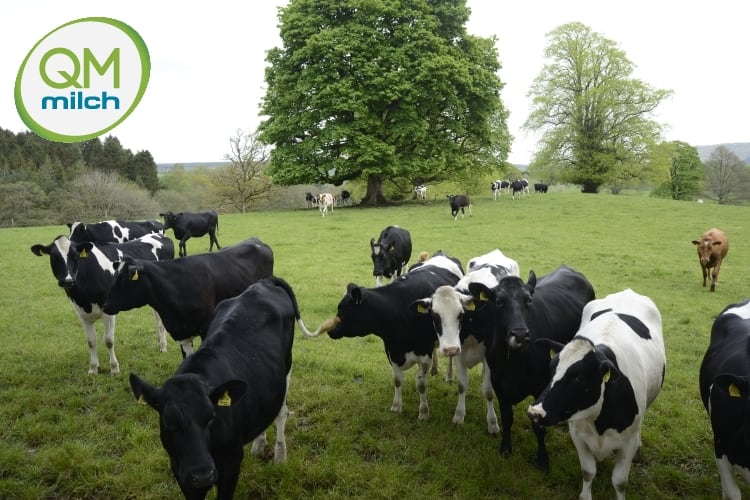The organization, which is an initiative of The German Farmers' Association (DBV), German Raiffeisen Association (DRV) and German Dairy Industry Federation (MIV), provides a process assurance system for milk production.
The aim of the QM Milch standard is to monitor the production process, thereby assuring the quality of the raw milk at farm level.
The QM Milch standard covers all the basic requirements that must be met throughout the process of producing cow's milk in Germany. It applies to all milk producers who participate in the QM Milch certification program, both voluntarily and pursuant to the terms and conditions for milk deliveries set by dairies. Under the certification process, suitable arrangements are made to place the certification body in a position to provide all relevant certification services.
QM Milch's list of criteria sets the conditions to be met for its certification program, which stem from legal provisions, good farming practices, and further requirements for milk production.
Animal health and well-being
Producing milk as a foodstuff must respect certain hygiene and housing conditions, the document says. Additionally, there are strict provisions relating to the health of the cattle. Also, cows that produce milk as a foodstuff must exhibit no recognizable signs of general health problems.
Routine monthly herd inspections are carried out to check udder health. Should there be a suspicion that an animal has an udder infection, an individual examination is necessary to determine how to treat the animal, or to ascertain whether it suffers from a chronic infection, or is resistant to treatment.
Animal identification and the farm register
Statutory provisions stipulate milk producers must place two ear tags on each cow. According to the order on the movement of livestock (Viehverkehrsverordnung -VVVO), each livestock producer must also keep a farm register. Any changes to the herd must be recorded in the official database on identification and origin (HI-Tier-Datenbank).
Milk production and storage
Milking parlors must have sufficient lighting and ventilation. The milking equipment, clusters and cooling tanks must be serviced regularly. There are specific hygiene requirements for milking that must be respected by the milking staff. The milk must be cooled and stored in a way that guarantees that it will not be adversely affected.
Feed
There are special requirements on the purchase and use of feed.
Milk producers may only use bought-in feed (compound and straight feed) from manufacturers and traders who respect an agreement based on the national standard feed framework agreement.
Feed is tested for any undesirable substances in the framework of monitoring programs carried out by official bodies and other institutions. Every delivery of feed must also be documented by the milk producer with delivery certificates, itemised invoices, or other elements of proof.
Veterinary medicinal products (VMPs)
Milk producers must clearly identify all cattle that have been treated.
Milk is regularly checked for inhibitors (several times a month), and all milk producers carry out their own on-farm checks to attend to their herds with the help of a veterinarian. Milk producers must also record every instance of VMPs being used on their livestock.
The document also notes that dairies need to carry out regular chemical analyses of the milk or dairy products. General checks and individual examinations test for substances (residues and contaminants), which are harmful or could lead to undesirable changes to the organoleptic properties of the milk or dairy product.
The new standard came into effect January 1, 2020, and replaces the QM Milch standard 2.0.
The standard is a dynamic system that is constantly being further refined to include new findings and requirements, and it will be updated every three years.
Documents are available online, in German, with English versions available.

